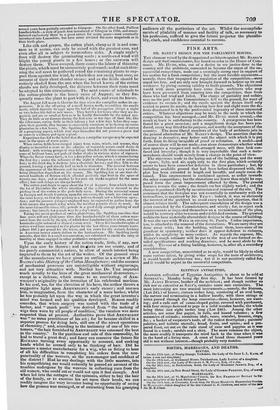FINE ARTS.
MR. BARRY'S DESIGN FOR THE PARLIAMENT HOUSES.
TnE clamour raised by the disappointed architects against Mr. BARRY'S design and the Commissioners, has found no echo in the House of Com- mons. Mr. HUME, who, out of a desire to see justice done to the country and the architects, consented to become the organ of the un- successful competitors, made out a seemingly strong case in support of his motion for a fresh competition ; but the most forcible arguments— namely, those that impugned the regulation of the competition—were urged too late, and are only now brought forward to bolster up its real weakness by giving seeming validity to futile grounds. The objections would with more propriety have come from architects who may have been prevented from entering into the competition, than from those who had tried and failed. The charge of partiality and unfair- ness on the part of the Commissioners fell to the ground, for want of evidence to sustain it ; and the cavils against the design itself only tended to prove its merits, by showing how few and slight were the de- fects discovered in it by the professional ingenuity of these interested critics. Whatever objections may be made to the mode in which the competition has been managed,—and Mr. HOME stated several,—the result at least is satisfactory to the country. A great genius has been found for a great occasion ; and a magnificent design has been pro- duced, every way fitted for its purpose, and worthy the acceptance of the country. The more liberal members of the body of architectsjoin in the general admiration of Mr. BARRY'S design. The assertion that the drawing is deceptive, may better suit the object with which it is put forth, from its being incapable of proof or refutation. A model—and of course there will be one made—can alone demonstrate whether what now appears a compact and well-arranged mass, will then look con- fused and irregular ; though it is very improbable that such a meta- morphosis should result merely from a change in the point of view. The objections made to the laying-out of the building, and the want of space, light, and air, apply only to the first plan, which certainly seems to have been somewhat defective in these particulars ; but, by including available ground that had been before dispensed with, the plan has been extended in length and breadth, and ample room ob- tained. This improvement is exclaimed against, as unfair towards the other competitors; but the alterations are fewer than might be sup- posed from the great improvement effected by them. The general features remain the same ; the details are but slightly varied ; and the change is produced chiefly by an extension and removal of the site. The statement that the first plan was not essentially in conformity with the instructions, is negatived by Mr. TRACY : indeed, it was so obviously the interest of the architect to avoid every technical objection, that it almost refutes itself. The subsequent emendation of the design was a point conceded by the Commissioners, and wisely ; for, to reject such improvements as suggested themselves on a reexamination of the plan, would be contrary alike to reason and established custom. The greatest architects have materially altered their designs in the course of building. It was the case with WREN in erecting St. Paul's. Undue importance, too, is attached to the removal of the decorations. We are sorry they are done away with ; but the building, without them, loses none of its grandeur or symmetry ; neither does it appear deficient in richness, whilst its simplicity is more evident. As regards the expense, Mr. BARRY'S rough estimate will be put to the test of one formed on de- tailed specifications and working drawings, and he must abide by the result. The cost of a fitting building, however, is, after all, a secondary consideration.
A new competition, unrestricted as to style, would be likely to elicit more various talent, by giving wider scope for the taste of architects; it would benefit architecture too ; but it is not positively called for, and it would be unjust to the successful competitors.


























 Previous page
Previous page